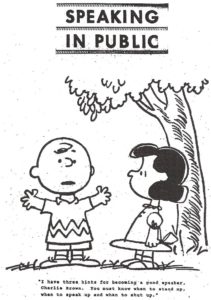 I’ll skip the part where I ask if public speaking scares the bejeezus out of you. If you’re like most of the rest of the people on the planet, the answer is yes.
I’ll skip the part where I ask if public speaking scares the bejeezus out of you. If you’re like most of the rest of the people on the planet, the answer is yes.
Let me save you a whole bunch of time and share with you the secret to great public speaking: Make it easy and fun for the audience to learn what they came to learn.
There. That’s it. The big secret’s out.
For all the hoopla around public speaking, it’s pretty straight-forward. We just tend to let our crazy brains make it scarier and more complicated than it needs to be. I mean, honestly, have you ever seen someone actually boo’d off the stage? Or pummeled by a tomato-throwing mob? Right. So take a deep breath and release all that worst case scenario business. Great public speaking is a must for anyone on a mission to make the world a better place.
These 3 Commandments summarize what countless articles, books, podcasts and webinars will tell you about great public speaking. #3 is particularly important for those on a mission, so pay special attention to it. #1 and #2 are universally true.
- Know thy stuff: Speak about what you know about. If you don’t know about it, don’t speak about it. Think of the best talks you’ve ever heard. Why were they so good? Probably, at least in part, because that person knew every in and out of their subject matter. They knew it so well they could tailor to what you, as the listener, wanted to learn. (They probably also practiced. If Bill Gates does it, so must you.)
- Know thy audience: If you’re following these commandments, you know your stuff. Now learn what your stuff has to do with the people to whom you will be speaking. What do they hope to learn from you? Do they want to be inspired or do they want to be able to go back to their office and immediately kick butt? These may sound like radically different talks, but usually it’s a matter of tweaking at the margins and staying focused on what your audience wants to learn…rather than being pulled off track by what you might want to say. (If this last sentence was confusing, read this.)
- Let thy passion shine through: This is where so many speakers go astray–especially those who are motivated by mission! Your passion is a huge advantage. It gets people’s “mirror neurons” firing and that means people in the audience are feeling what you’re feeling. If you’re oozing passion, they’ll be cheering you on. If you’re oozing boredom and/or trepidation, they’ll feel, well, bummed out. You get so worried about people throwing tomatoes at you (not gonna happen, right?) that you read from a script. Word for word. If the only thing you make eye contact with during your talk is a piece of paper, you’ve missed the boat. Make eye contact with your audience. If you follow Commandments #1 and #2, you will know your stuff and know your audience. You can then give the gift of letting others see your passion for your topic at full force. (Hint: If it gives you confidence to have your entire script in front of you, go for it. But go through and make your key points in 36+ point font size and highlight them. If you get lost, you say, “I get so excited about this stuff that sometimes I get carried away. Let me see, where was I? Oh yes, here we are…” No one will fault you for getting carried away, so long as you bring it back to what they’re there to learn.)
Enough already. Go be awesome.
[Photo credit: http://ourspeeches.com]
